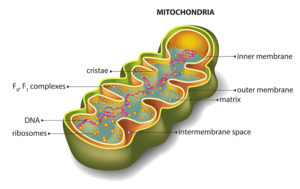Table of Contents
for Better Energy, Mood & Performance
Mitochondria play a critical role in our quality of life and longevity. They are the source of life and death for neurons. In fact, the natural function of every brain cell is in jeopardy without healthy mitochondria.
Mitochondria are tiny organelles in brain cells that act like batteries. They generate most of the ATP (adenosine triphosphate) that your cells use for energy.
The human brain has a higher concentration of these little cellular powerplants than most other cells in your body. You have anywhere from two to several thousand mitochondria in each brain cell. They even have their own DNA.
In fact, they are your body’s master energy system. Allowing you to hear, feel and see. Mitochondria beat your heart, stimulate your sex drive and allow you to think.
Mitochondria power every function and organ in your body.
So the importance of maintaining healthy mitochondria, and growing new ones (mitochondriogenesis), must be at the heart of planning any nootropic stack.
When you increase the number of mitochondria, you have more energy to power through your day.
Why Mitochondria Need Your Help
Mitochondria are especially vulnerable because they don’t have some of the systems that protect and repair DNA in the rest of the host cell. And it’s easier than you’d expect to hurt mitochondria.
 Mitochondria evolved from ancient bacteria. At some point, cells swallowed up these primitive bacteria. And over time, they have become our own cell’s power plants.
Mitochondria evolved from ancient bacteria. At some point, cells swallowed up these primitive bacteria. And over time, they have become our own cell’s power plants.
So logic tells us that any drug or compound that targets bacteria will also have an impact on these tiny cellular powerplants.
Antibiotics are a classic enemy of mitochondria. And it’s not just the prescription that your doctor writes. In 2011 alone, 5.6 million kilograms of tetracycline were fed to livestock in the USA. You’re exposed every day to these drugs that harm your brain cell’s mitochondria.
When your mitochondria begin to deplete, or get weaker, you lose your energy. Dysfunction of mitochondria has been implicated in things like schizophrenia, bipolar disorder, dementia, Alzheimer’s disease,[i] Parkinson’s disease, epilepsy, stroke, cardiovascular disease, and chronic fatigue syndrome.[ii]
With mitochondria playing such a pivotal role in our quality of life, finding ways to support them should be top of your list when putting together your stack.
Here are 12 natural ways to boost your mitochondria.
 12 Nootropic Supplements that Support Mitochondrial Function
12 Nootropic Supplements that Support Mitochondrial Function
Acetyl L-Carnitine (ALCAR)
Acetyl-L-Carnitine is an amino acid that plays a critical role in making energy in your cells. ALCAR transports fatty acids into mitochondria where they are used to produce fuel. ALCAR then does double duty by carrying toxic waste out before it can do damage.
The problem is that carnitine levels drop as you age. Or you don’t get enough L-Carnitine from the food you eat. Low ALCAR levels can happen at any age.[iii]
Studies show that when your mitochondria slow down, supplementing with ALCAR can get them going again. ALCAR even helps reverse problems with mitochondria caused by age or everyday toxic damage.[iv]
Recommended dosage of ALCAR for improved mood, elimination of fatigue, or memory problems is 500 – 1,500 mg per day.
Alpha Lipoic Acid
Alpha-Lipoic Acid (ALA) R-Lipoic Acid which is the natural form of ALA, is a cofactor for mitochondrial enzymes involved in brain cell energy production.
Cellular energy is behind every single action that happens in your body. Including your brain. Cellular energy is required for muscle movement, producing new cells (neurogenesis), wound healing and thinking.[v]
The mitochondria in each or your cells is the source of this energy. This ongoing energy production process is call the Krebs cycle. Alpha-Lipoic Acid is a cofactor to two key enzymatic reactions within the Krebs Cycle.
In the simplest terms, without ALA, cellular energy is not possible. And without cellular energy, well… life is not possible.
Recommended dosage of Alpha-Lipoic Acid for improving memory, recall, focus and concentration is 50 – 600 mg per day.
CoQ10
Coenzyme Q10 (CoQ10) is in the mitochondria in your cells. This is where cellular energy is produced. It acts as an electron  acceptor or donor in the chain of reactions that lead to cellular energy production.
acceptor or donor in the chain of reactions that lead to cellular energy production.
When oxidized CoQ10 (ubiquinone) accepts an electron from another molecule in the chain, it becomes Ubiquinol. And when Ubiquinol donates an electron, it becomes ubiquinone. This state of equilibrium is necessary and how your body benefits from CoQ10.
CoQ10 as a nootropic nutrient and antioxidant is high-octane fuel used by every cell in your body to power everything it does. CoQ10 is essential for the normal function of all your vital organs. Especially the energy hungry organs like your brain and heart.
The bottom-line is CoQ10 helps to make ATP produced in the mitochondria in your brain cells. Boosting energy, cognition, memory and recall.[vi]
Recommended dosage of CoQ10 is 200 – 400 mg per day. You may find that the Ubiquinol version of CoQ10 works better for you than ubiquinone.[vii]
L-Carnosine
L-Carnosine – Your brain uses l-carnosine to repair tissue and clear away toxins. And increase the energy output of your mitochondria. It’s known as the ‘longevity molecule’. But don’t let that put you off if you’re not concerned about anti-aging.
Carnosine levels decrease with age – starting at age 10! And decrease by 63% by the time you reach 70.[viii] But taking L-Carnosine as a nootropic can revive mitochondria. Even rescuing brain cells if the mitochondria have stopped functioning.[ix]
L-Carnosine prevents and reverses the damage done by advanced glycation end products (AGEs). AGEs are created in your brain by sugars binding to amino acids and caused by a variety of things including certain food and cooking techniques. Affecting word recall, response time, and cognition.
One study even found that autistic children supplementing with L-Carnosine for 8 weeks improved their behavior, sociability, communication and vocabulary.[x]
Recommended dosage of L-Carnosine is 500 mg twice per day.
Magnesium
 Magnesium assists in converting energy supplied by food to a useable form to produce adenosine triphosphate (ATP). It’s needed for the Krebs cycle that turns sugar and fat from your diet into ATP. The primary fuel source created within each of your mitochondria.
Magnesium assists in converting energy supplied by food to a useable form to produce adenosine triphosphate (ATP). It’s needed for the Krebs cycle that turns sugar and fat from your diet into ATP. The primary fuel source created within each of your mitochondria.
ATP must be bound to a magnesium ion (Mg-ATP) in order to be biologically active.[xi] This is critically important to how your brain’s mitochondria and cells use ATP. Including the synthesis of DNA and RNA. Without magnesium, your brain cannot produce ATP, and all brain function breaks down.
Magnesium is also critical for maintaining the neuroplasticity required for your ability to learn and form memories. Magnesium ions control the ion channels, or electrical switches for this signaling.[xii] And using magnesium as a nootropic has been proven to restore neuroplasticity and improve cognitive function.[xiii]
Neurohackers who add magnesium to their nootropic stack report increased levels of focus, energy, memory, and cognitive ability.
Recommended dosage of magnesium is 400 mg before bed. You’ll have much better results by using magnesium-L-Threonate as a nootropic supplement.
Methylene Blue
Methylene Blue has a 140-year track record for therapeutic use for everything from Alzheimer’s to malaria and urinary tract infections.
Recent research shows Methylene Blue provides a profound effect when hacking your mitochondria. It donates electrons to the electron transport chain in mitochondria. This process creates adenosine triphosphate (ATP) within your mitochondria.
Methylene Blue works as an ‘alternative electron carrier’ in the event that things break down. Like a broken electron transport chain damaged by toxins or stress.
Methylene Blue is a powerful antioxidant because it stops the oxidative cascade at its very beginning. Before it gets a chance to do damage within mitochondria and your brain cells.
And Methylene Blue is monoamine oxidase inhibitor (MAOI). Raising levels of catecholamines like dopamine and norepinephrine in your brain and improving mood. It’s a great antidepressant on its own.
Neurohackers who use Methylene Blue report that is helps when studying, puts them in a better mood, workouts are better and easier, less social anxiety and a better quality of sleep. Older Neurohackers say Methylene Blue helps them “feel young again”.
Use only pharmaceutical (USP) grade Methylene Blue as a nootropic. And remember it has a hermetic dose response. Meaning too low or high a dose will not work. In fact, too high a dose can be toxic.
Recommended nootropic dosage for Methylene Blue is 0.5 – 4 mg/kg of body weight. And please do not use MB if you’re on any type of antidepressant medication. Or you’ll put yourself in danger of Serotonin Syndrome.
N-Acetyl L-Cysteine (NAC)
N-Acetyl L-Cysteine (NAC) is an amino acid and potent antioxidant. NAC helps make glutathione, the body’s most powerful antioxidant.[xiv] Glutathione is the main line of defense for mitochondria. It helps prevent and repair oxidative damage which protect your mitochondria.
N-Acetyl L-Cysteine reduces oxidative stress. Oxidative stress results in free radical damage in brain cells. And you experience oxidative stress every day no matter what your age. A classic example is the aspartame in Diet Coke and other soft drinks which causes inflammation and oxidative stress in your cerebral cortex.
One study showed that NAC boosted Brain-Derived Neurotrophic Factor (BDNF) levels, blocked the COX-2 and PGE2 inflammatory enzymes, and reduced the expression of interleukin-6 (IL-6) and tumor necrosis factor-α (TNF-α) inflammatory cytokines. And replenished glutathione levels.[xv]
N-Acetyl L-Cysteine (NAC) suggested dosage for cognitive benefit is 500 mg 3-times per day. Clinical studies have found that doses up to 2,000 mg per day are safe and effective.
NADH
NADH (Nicotinamide Adenine Dinucleotide + Hydrogen, or coenzyme 1) is the active coenzyme form of Vitamin B3 (niacin). Every cell in your body contains NADH.
NADH is the primary carrier of electrons in the transfer of food from your diet into energy. This energy is stored as adenosine triphosphate (ATP). ATP is the cellular fuel created within each of your mitochondria. Not enough NADH leads to ATP depletion, which can eventually lead to cell death.[xvi]
NADH is directly involved in the production of the critical neurotransmitters dopamine, norepinephrine and serotonin. So when you add NADH to your nootropic stack, cerebral electrical activity increases in areas of your brain used for attention, cognition, focus, memory, concentration, and decision making.
Neurohackers use NADH to relieve the symptoms of jet lag. And the symptoms of Chronic Fatigue Syndrome.
Recommended dosage of NADH is 10 mg per day.
Resveratrol
Resveratrol is a polyphenol antioxidant found in the skin of grapes. Resveratrol’s purpose is to protect the grape from microbial  attacks, cold weather and UV radiation.
attacks, cold weather and UV radiation.
Resveratrol is gaining a reputation among Neurohackers for controlling brain inflammation, boosting dopamine, helping reverse cognitive decline and fighting brain cell aging.
Resveratrol as a nootropic inhibits PDE4 which boosts cAMP activity. It also helps tame brain inflammation, boosts cerebral blood flow, increases BDNF and prevents oxidative damage to brain cells and mitochondria.
Your safest bet when choosing a Resveratrol supplement is an extract from grapes or red wine which contain no impurities. And ideally, choose ‘Trans-Resveratrol’ or the ‘micronized’ version of Resveratrol.
Recommended dosage for Resveratrol is 20 – 250 mg per day.
Rhodiola Rosea
Rhodiola Rosea is an adaptogen that has a reputation in the nootropic community for its energizing and anti-fatigue qualities. Rhodiola activates the synthesis and re-synthesis of adenosine triphosphate (ATP), your body and brain cell’s main energy source.
Studies show that Rhodiola saves injured neurons. And encourages the growth and development of brain cells (neurogenesis).[xvii] And Rhodiola increases AMPK which is an enzyme found inside each or your cells. AMPK acts as your body’s master regulating switch.
When AMPK is “switched on” it triggers the use of stored energy from fats, removes fats and sugars from the blood, boosts mitochondrial production, reduces inflammation, and takes out the cellular “garbage”.[xviii]
Any kind of fatigue you experience – regardless of source – Rhodiola Rosea is like your “magic bullet”. Mood, energy, stamina and concentration can all increase with a dose of this herb.
To ensure the supplement you choose works and contains pure Rhodiola Rosea, it needs to be standardized to contain at least 3% rosavins and 1% salidroside. This is the ratio found in the natural root. Recommended nootropic dose of Rhodiola Rosea is 150 – 200 mg per day.
PQQ
PQQ (pyrroloquinoline quinone) is an enzyme cofactor, and the only nutrient known to facilitate the growth of new mitochondria (mitochondriogenesis) in your brain cells.
Without PQQ, mitochondria wear out and brain cells age faster. Adding PQQ to your nootropic stack should give your brain an energy boost. Because your brain cells have a higher concentration of mitochondria than most other cells in your body.[xix]
PQQ goes well with CoQ10 because CoQ10 helps you make the fuel you produce inside your mitochondria. So you’re increasing the amount of energy you produce with CoQ10, and PQQ increases the number of engines you have to produce the fuel. Recommended daily dosage of PQQ is 10 – 20 mg. Any supplement which contains naturally produced BioPQQ® is preferred.
SAM-e
SAM-e (S-Adenosyl Methionine) is the naturally occurring amino acid methionine bound to an ATP molecule. And is found in the mitochondria of nearly every cell in your body.
SAM-e is made from methionine and ATP (adenosine triphosphate) during a cycle that recycles the amino acid homocysteine. This cycle requires Vitamin B6 and B12 and folate (B9) to work properly.
SAM-e is involved in the synthesis and breakdown the neurotransmitters acetylcholine, dopamine, serotonin, norepinephrine and melatonin in your brain. SAM-e also helps produce the powerful antioxidant glutathione through a process called transsulfuration. And SAM-e maintains cell membranes and plays a role in a healthy immune system.
As if that’s not enough, SAM-e is a methyl donor for the enzyme that methylates your DNA. When SAM-e levels are high enough, a stressful event will not result in DNA de-methylation.
Instead, a stressful event enhances DNA methylation of ‘immediate-early genes’. Which suppress their expression and allows you to adapt in a healthy way to this stressful situation.[xx] Which makes SAM-e a powerful antidepressant.
Recommended dosage of SAM-e for nootropic benefit is 400 mg per day.
But one big word of caution: SAM-e needs Vitamins B6 & B12 and folate to work. Or SAM-e will elevate your homocysteine levels. High homocysteine can cause heart attacks.
In Summary
Nearly every one of these nootropics are included in my personal stack. I find that together they provide the energy I need for a long work day. With the added benefit of quicker thinking.
The neurons and neurotransmitters you’re targeting with nootropics will not work without healthy mitochondria fueling your brain cells. Complete your nootropic stack with at least some of these nootropics for a better quality of life.
Performance Lab® Energy contains four of the mitochondria-boosting nootropics detailed in this post. You get effective dosages of Acetyl L-Carnitine (ALCAR), R-Lipoic Acid, CoQ10, PQQ and magnesium in two vegan-friendly NutriCaps® capsules. And they include BioPerine® to help boost absorption even more.
After personally testing this stack for years I can vouch for its authenticity. This stack helps increase energy levels, and when used daily, I can work all day long without getting fatigued.
And even better – no crash later in the day like you get from using stimulant-based energy drinks.







Join The Discussion - 34 comments
Irene
October 8, 2024
Hello David,
Thanks for your great posts. They are a great help to me and to others. I have a question regarding methylene blue ( 15 mg) and rhodiola. Can you take these two, not necessarily at the same time, but during the same day? Thanks.
David Tomen
October 11, 2024
Irene, Rhodiola Rosea acts as a Monoamine Oxidase Inhibitor (MAOI). And Methylene Blue is contraindicated with MAOIs. That combo could cause trouble. Any time there is a warning of the danger of Serotonin Syndrome it seems to me that it’s better to find an alternative depending on what you are trying to do or fix.
Wayne Schenet
April 7, 2023
David,
This is a great presentation to support brain health!
I currently take 9 of the 12 items and plan to add the other 3.
I appreciate your wealth of knowledge!
Best regards,
Wayne
David Tomen
April 9, 2023
Thank you Wayne. Much appreciated.
Kevin
December 28, 2022
Hello I like this site there is a lot of useful information I would like to know
Is astaxanthin and better than alpha-lipoic acid for other antioxidant regeneration and neurogenesis
David Tomen
December 28, 2022
Kevin, one is not ‘better’ than the other because each provide their own unique nootropic benefits.
Sydney
August 27, 2022
Hi David.
Thank you for this amazing and informative article. I have suffered from a TBI, and have chronic fatigue after experiencing Covid-19. I am curious as to which neurotrophic you recommend the most for fatigue?
David Tomen
August 31, 2022
Sydney, if I was dealing with Long COVID I would be using every supplement on the page above with the possible exception of SAM-e or NADH. And I would be replacing NADH with plain old niacin.
I haven’t had the time to write on article on best nootropics for Long-COVID. So if you need more info then please schedule a consultation with me.
Herbert
February 28, 2023
Hi, I read your website daily and even bought the book from amazon in case the website goes down. The book is huge and the tickest I have seen…lol
I wonder if you could recomend supplements for Chronic Fatigue syndorme (CFS) and Stammering (Speech inpediment).
Thanking you in advance
David Tomen
March 6, 2023
Herbert, thanks for getting a copy of Head First 2nd Edition and please help spread the word. A review on Amazon would be greatly appreciated as well.
Please read my review of Performance Lab Energy here (https://nootropicsexpert.com/performance-lab-energy-review/) because the individual ingredients in that stack help with chronic fatigue.
And try Sulbutiamine (https://nootropicsexpert.com/sulbutiamine/) for stuttering because there are clinical studies showing thiamine helpful with that speech impediment.
James
August 3, 2022
Hey David,
Just wanted to ask about this point you made from the Magnesium section:
“ATP must be bound to a magnesium ion (Mg-ATP) in order to be biologically active.”
Would that mean then that it would be beneficial to take Magnesium with COQ10 (and/or PQQ)? Or is it more so about just having *enough* Magnesium in your system for COQ10 to be effective?
David Tomen
August 4, 2022
James, it is the latter. You just need a steady level of magnesium in your system. And the intelligence built-in figures out how to use that magnesium. In every single cell of your body and brain.
Daniel
July 23, 2022
Just doing some research on ALA and discovered it can cause problems for people with amalgam fillings.
I was wondering what your opinion on this is?
David Tomen
July 23, 2022
Daniel, Alpha Lipoic Acid chelates heavy metals like mercury, arsenic and cadmium from your body and brain. Some may feel sick while these heavy metals are being removed. If you do not want to get rid of these heavy metals then you should not supplement with ALA.